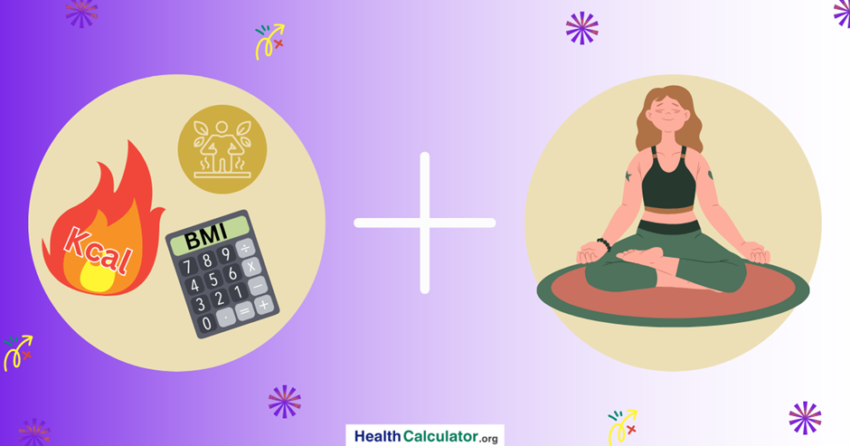The integration of health calculators and yoga represents a harmonious fusion of quantitative assessment and qualitative self-care. But before going further to understand it, let’s see what these health calculators are and what their types are.
In simple terms, a health calculator is an invaluable tool for assessing and understanding key aspects of one’s health. It can help you make some informed decisions based on insights for your health improvement.
Different types of health calculators:
· BMI (Body Mass Index) Calculator: Provides a numerical indication of an individual’s weight status relative to their height, offering insights into potential health risks associated with weight fluctuations.
· BMR (Basal Metabolic Rate) Calculator: Estimates the number of calories your body needs to maintain basic physiological functions at rest, serving as a foundation for calorie management and weight maintenance.
· TDEE (Total Daily Energy Expenditure) Calculator: Calculates the total number of calories your body needs in a day, taking into account your BMR and activity level. It’s useful for setting calorie targets for weight loss, maintenance, or gain.
· Macro Calculator: Determines the ideal distribution of macronutrients (carbohydrates, protein, and fat) based on individual goals, such as weight management, muscle gain, or athletic performance.
In today’s time, these health calculators are used by gyms, athletes, and health and fitness specialists to make rightful health decisions based on data, but the health calculator can also be used in yoga as well, and actually, they complement each other quite well.
Let’s see how health calculators and yoga can go hand in hand.
· BMI Calculator and Yoga Practice:
Awareness of body mass index can help yoga practitioners understand before and after yoga weight loss, their body composition and how it relates to their yoga practice. For instance, individuals with a higher BMI may find certain poses more challenging and may need to modify their practice accordingly.
Yoga can be a beneficial component of weight management strategies for individuals aiming to achieve a healthier BMI. Regular practice can improve strength, flexibility, and overall fitness, contributing to weight loss and maintenance efforts.
· BMR and TDEE Calculators in Yoga:
Knowledge of Basal Metabolic Rate (BMR) and Total Daily Energy Expenditure (TDEE) can inform practitioners about their energy needs, especially if they are looking to optimize their nutrition for better performance on the mat. It can also help in estimating things like calorie burn in yoga, and correlation of yoga and metabolism.
Understanding one’s energy requirements can help ensure that practitioners fuel their bodies adequately before and after yoga sessions, supporting recovery, performance, and overall well-being.
· Macro Calculator and Yoga Nutrition:
A macro calculator helps determine the ideal distribution of macronutrients (carbohydrates, proteins, and fats) based on individual goals. This knowledge can guide yogis in fueling their bodies with balanced and nourishing meals that support their yoga practice.
By paying attention to macronutrient intake, practitioners can optimize energy levels, promote muscle recovery, and enhance overall performance during yoga sessions.
· Goal Setting and Motivation:
Health calculators can assist yoga practitioners in setting realistic goals related to weight management, nutrition, and fitness. Having clear, measurable objectives can provide motivation and direction for one’s yoga practice.
Whether the goal is to achieve a healthier BMI, improve flexibility, or enhance overall well-being, health calculators can serve as tools for tracking progress and celebrating achievements along the yoga journey.
· Mind-Body Connection:
Yoga encourages a deep connection between the body, mind, and breath. Utilizing health calculators can deepen this connection by fostering self-awareness and mindfulness around one’s physical health and well-being.
Practitioners may develop a greater appreciation for how their lifestyle choices, including nutrition and exercise habits, impact their overall health and yoga practice.
In conclusion, while health calculators provide quantitative data related to various aspects of health and fitness, yoga offers a holistic approach to well-being that encompasses physical, mental, and emotional dimensions. By integrating these tools and practices, individuals can cultivate a balanced and mindful lifestyle that supports their journey toward optimal health and vitality.

